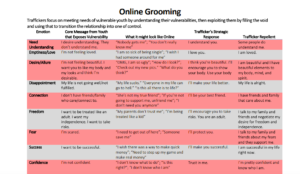According to a study by The University of Toledo in Ohio, sex traffickers are increasingly using the internet, specifically social media, to recruit and sell adolescents.
The study found that traffickers are able to exploit the teens even without ever meeting face to face. Usually, traffickers are preying on vulnerable young teens—usually girls. Through 16 case studies, the report found that most traffickers first start by studying what a teen posts on sites like Facebook, Snapchat, and Instagram. He then uses that content to build rapport to get the girl to trust him.
What Kind of Adolescents Do Traffickers Target?
Often, traffickers look for vulnerability. Vulnerable teens are more easy to rein in, because they don’t have the security of a stable home life or family.
Many times, the victims are girls who feel lonely, misunderstood, depressed, or otherwise unhappy with themselves or their lives, according to the study. The exploiters then seek to “fill the hole that these girls are feeling” by telling them that they’re beautiful, that they understand them, and that they care.
Study the report’s chart below closely. It details just how sex traffickers connect to vulnerable teens through the posts they share on social media. Show the chart to your teen and make sure they understand how these posts could be bringing sex traffickers and other unwanted creeps to their social media pages. Alternatively, the chart can also be seen in the report itself, on page six.

After establishing a connection, the trafficker is then able to encourage the teen to start performing sexual favors for him or her.They might ask a teen to send a risqué photo or video to them, which they can then immediately post online to advertise the teen’s sexual services. And they might also convince the teen to move in with them, which is where the cycle of prostitution and trafficking might start.
Why Would a Teen Fall For This?
You might think that your teen would never fall prey to such a situation.
However, the truth is that many young girls, especially ones who are lonely, can fantasize about a stranger whisking them away to a happily-ever-after life. That’s why they might find attention from others online thrilling, while to others it could scream danger.
To make matters worse, sex traffickers don’t come out and say what they’re doing from the very beginning. They’re savvy manipulators. The predators who exploit these vulnerable young teens often pose as “Internet Romeo,” says Bethany Gilot, human-trafficking prevention director at the Florida Department of Children and Families. “It can start off with something as simple as a flattering comment on Faceook”, where these dangerous men are posing as “cute, innocent boys.”
Little do these girls know that their “Romeos” are posting hundreds of messages a day on different profiles, hoping to get one that bites. And when one does, they know they’ve struck gold.
“[They] know that a young girl who responds to a stranger may have boundary issues that can be exploited,” she tells TIME magazine in an interview.
How to Prevent Your Teen From Being Targeted
Perhaps the most important takeaway message from all this is the one you’ve been repeating to your teens all along, since they were little:
Don’t talk to strangers.
But that instruction is of little use once the interaction has already started.
Is My Teen Talking to a Predator Online?
If you suspect your teen is talking to a stranger online, confront them immediately. Try to get them to block the person on the app –and report them – right away. Note that your teen may be reluctant to do so, especially once an emotional connection has already been made. Also, you might need to enlist help from a third party. You can call the National Human Trafficking Hotline at 1-888-373-7888 (TTY: 711) or Text 233733 to learn more about how you can help your son or daughter.
But even once this specific crisis ends, your work is not over. You need to figure out why such a scary scenario happened in the first place. And figure out how to make sure it never happens again. Teens who have trouble maintaining boundaries with others – like those who do accept advances from strangers online – need to get help for certain mental health issues like low self-esteem, codependency, trauma, depression, and anxiety. Treatment at a teen mental health center, whether it’s a residential treatment center, partial hospitalization program, or an intensive outpatient center, will help your teen learn how to set boundaries, recover from trauma, and build a healthy sense of self.






